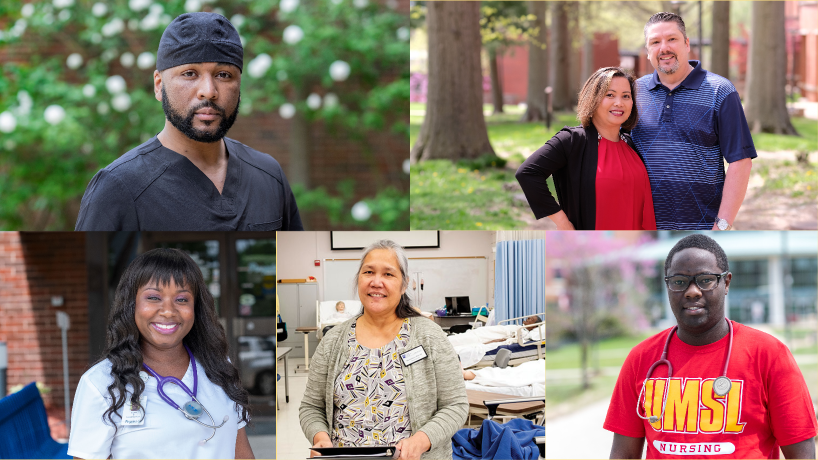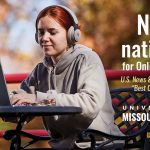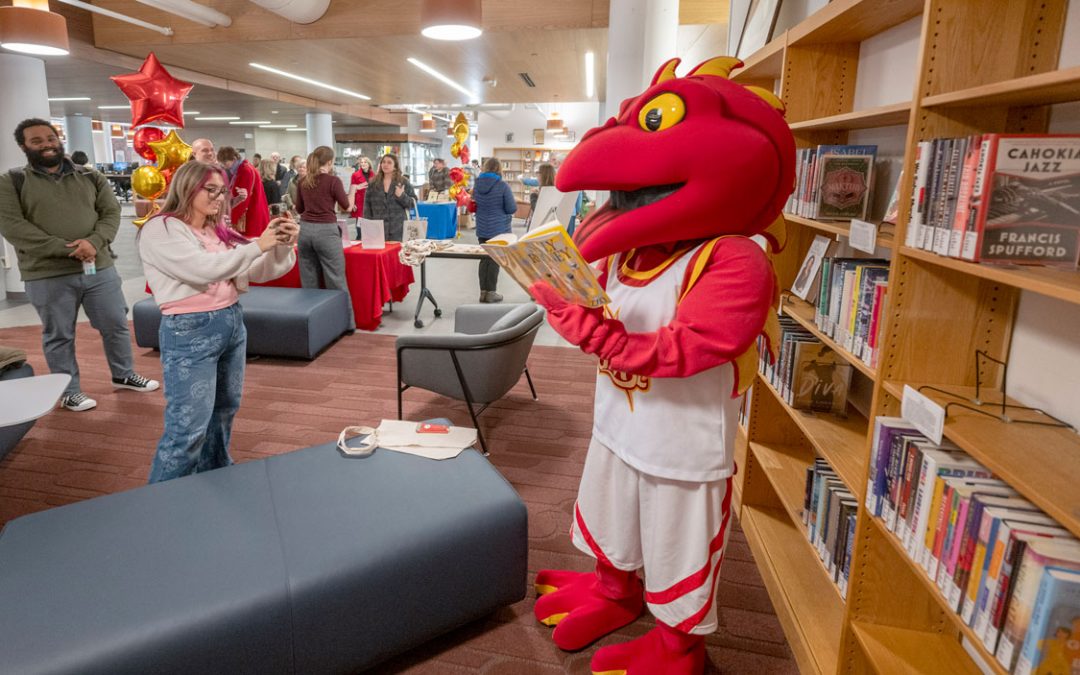
UMSL nursing graduates (clockwise from top left) Brandon Gilliam, married couple Marianne and Lance Huff, Peter Mwariri, Maria Darris and Crystal Bailey all took advantage of the RN to BSN Program. The purpose is to increase the quantity of quality BSN- prepared nurses in the region and speaks to the College of Nursing’s core vision of “shaping the future of nursing and health care in our community.” (Photos by August Jennewein)
Like many University of Missouri–St. Louis graduates, Maria Darris has always had to shape her life around decisions about work and money.
As a new immigrant from the Philippines, she became a caretaker at a nursing home because it was the only position available to her. She joined the Army in order to afford school because there was only enough cash on hand to pay for her young sister’s education. Then, like many who go on to become registered nurses, she opted to attend community college and earn an associate degree, so she could join the workforce faster than a four-year degree would allow.
It was only natural that when she returned to school for a BSN, she decided to attend the College of Nursing RN to BSN Program.
“When youʼre a working nurse, itʼs all about availability and money,” says the 2011 graduate, pointing out that the UMSL program costs less than any other area school, even after considering any employer discounts. “Iʼd rather spend my money on something else for my family than spend it at another school when I can get an education at UMSL that’s as good or better than any other school.”
Many of the nurses that go through UMSL’s RN to BSN Program have similar stories to Darris, who now works as a nursing instructor at St. Louis Community College-Florissant Valley and regularly recommends UMSL to her students.
Affordability and flexibility are the whole point of the program, which has been serving to
elevate the skills and career prospects of registered nurses in order to benefit health outcomes of patients in the St. Louis region and beyond since 1981.
College of Nursing Dean Emeritus Shirley Martin established the RN to BSN Program as one of the college’s two original offerings. The program’s purpose – increasing the quantity of quality BSN- prepared nurses in the region – speaks to the college’s core vision of “shaping the future of nursing and health care in our community.”
“There weren’t many programs when we started,” says Liz Mantych, a long-time faculty member and director emeritus of the RN to BSN Program. “While there are more RN to BSN programs available today, our program remains highly respected and continues to be known for dedicated faculty that care about their students.”
Opening doors
Nurses don’t need BSNs to work. They can enter the profession with an associate degree after passing the National Council Licensure Examination.
But the BSN opens many doors and is increasingly required by hospitals attempting to achieve or keep Magnet status, the highest credential for nursing facilities.
A desire to become an educator prompted Darris to earn her BSN, then her MSN, at UMSL. Scott Reed, a 2021 graduate who is now a behavioral health RN, returned to school so he could potentially continue on to become an advanced practice registered nurse, though he changed his mind after earning the degree.
“If I wish to pursue a management position in the future, I can do so,” Reed says. “Nursing is such a great opportunity because you can do so much with the degree. So many jobs and fields in so many locations are open to you.”
Meeting students where they are
Like most of the RN to BSN students, Reed went through the program at his own pace in order to effectively balance work, school and paying for school. That was a challenge, but he was able to make it work thanks to the program’s welcoming environment and supportive instructors such as Mantych.
“The workload was enough to give me the experience needed to actually feel I earned the degree, while being metered out at an achievable pace,” he says. “The instructors laid out their expectations for the assignments clearly and concisely while at the same time extending multiple offers of help or clarification.”
There are generally about 40 students in the program at any given time, and they can start – or stop – at any time. Classes are offered every eight weeks for maximum flexibility.
The College of Nursing delivers the courses primarily online and also will work with area health care facilities that wish to offer the bridge to a BSN for their employees.
“One of the unique things about the program is that we really meet students where they are, professionally and personally,” says Alicia Hutchings, RN to BSN Program director and vice provost fellow for student success. “We recognize that these students are busy adult learners, so we have a curriculum that allows for flexibility.”
Since students already have pre-licensure clinical skills, the program focuses on the professional elements of nursing, such as leadership and management, research, health policy and global and community health.
Students might be nurses of varying experience, fresh from community college or in a dual enrollment program.
“Whatʼs really fantastic in these classes is this ability for students who have little practice experience to be in same classes with people with years of practice experience,” Hutchings says. “The lessons that they learn from each other can be really invaluable.”
Teaching both groups presents challenges, but the students rise to the circumstances.
“One of the great things about RN to BSN students is that theyʼre pretty eager to do this,” Hutchings says. “Theyʼve come back. Theyʼve sought this out for a reason, and theyʼre invested.”
Leading change
Having more highly educated nurses benefits community health as well as individual practitioners.
When students leave the RN to BSN Program, they’re well positioned to impact health while expanding their professional identities.
“We prepare students for the future of nursing, not just where theyʼve come from,” College of Nursing Dean Roxanne Vandermause says. “Thereʼs definitely a broader body of information that a baccalaureate nurse has as evidenced by the courses that they get when they come in – the policy, the population health and the social determinants of health – the broader aspects of nursing. Our discipline and our profession have been changing really over the past several decades, and UMSL has led the change.”
This story was originally published in the spring 2022 issue of UMSL Magazine. If you have a story idea for UMSL Magazine, email magazine@umsl.edu.














